
SCANXIETY


SCANXIETY
Diana Wiig finds strength in boxing and cancer advocacy
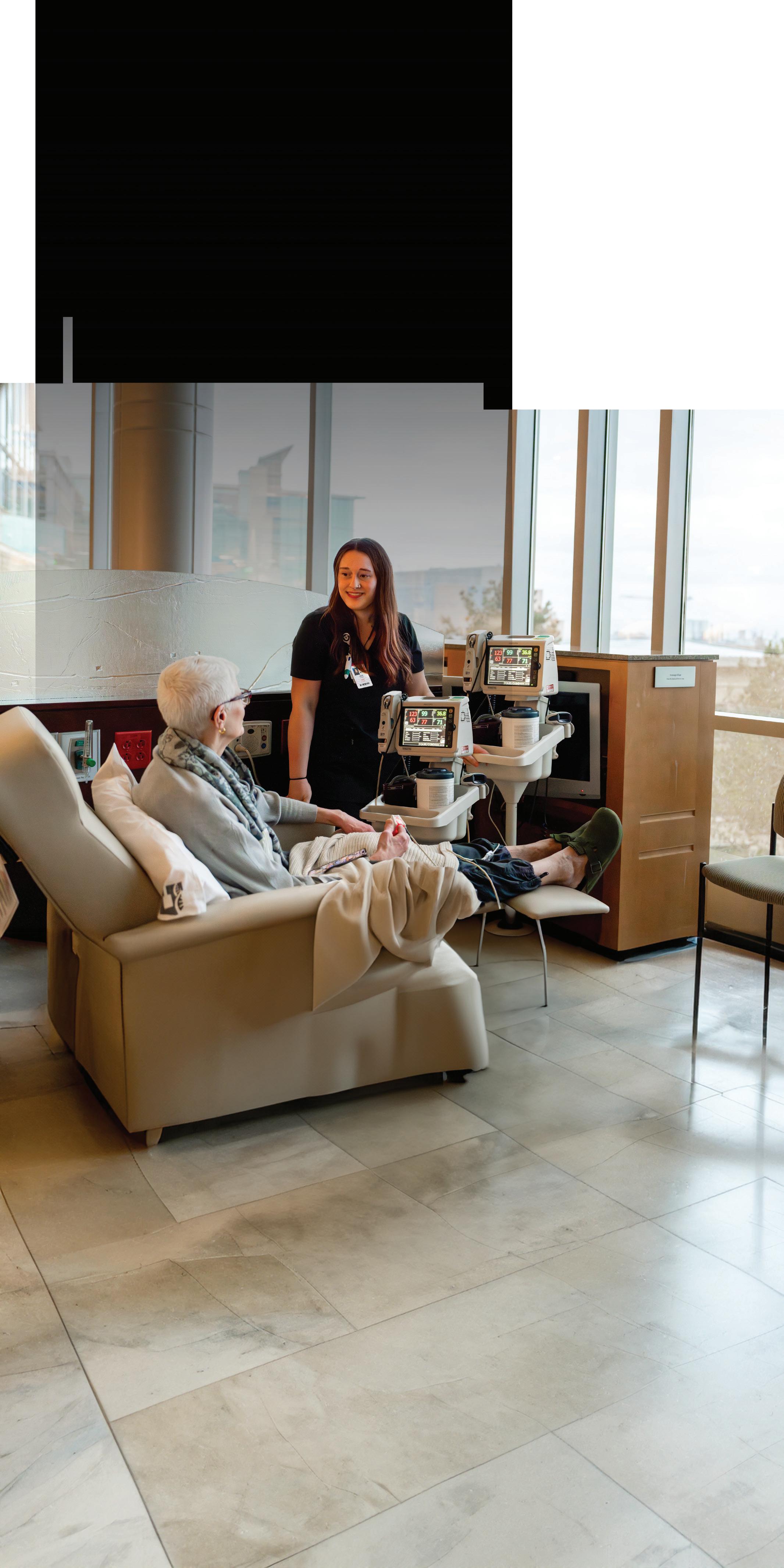

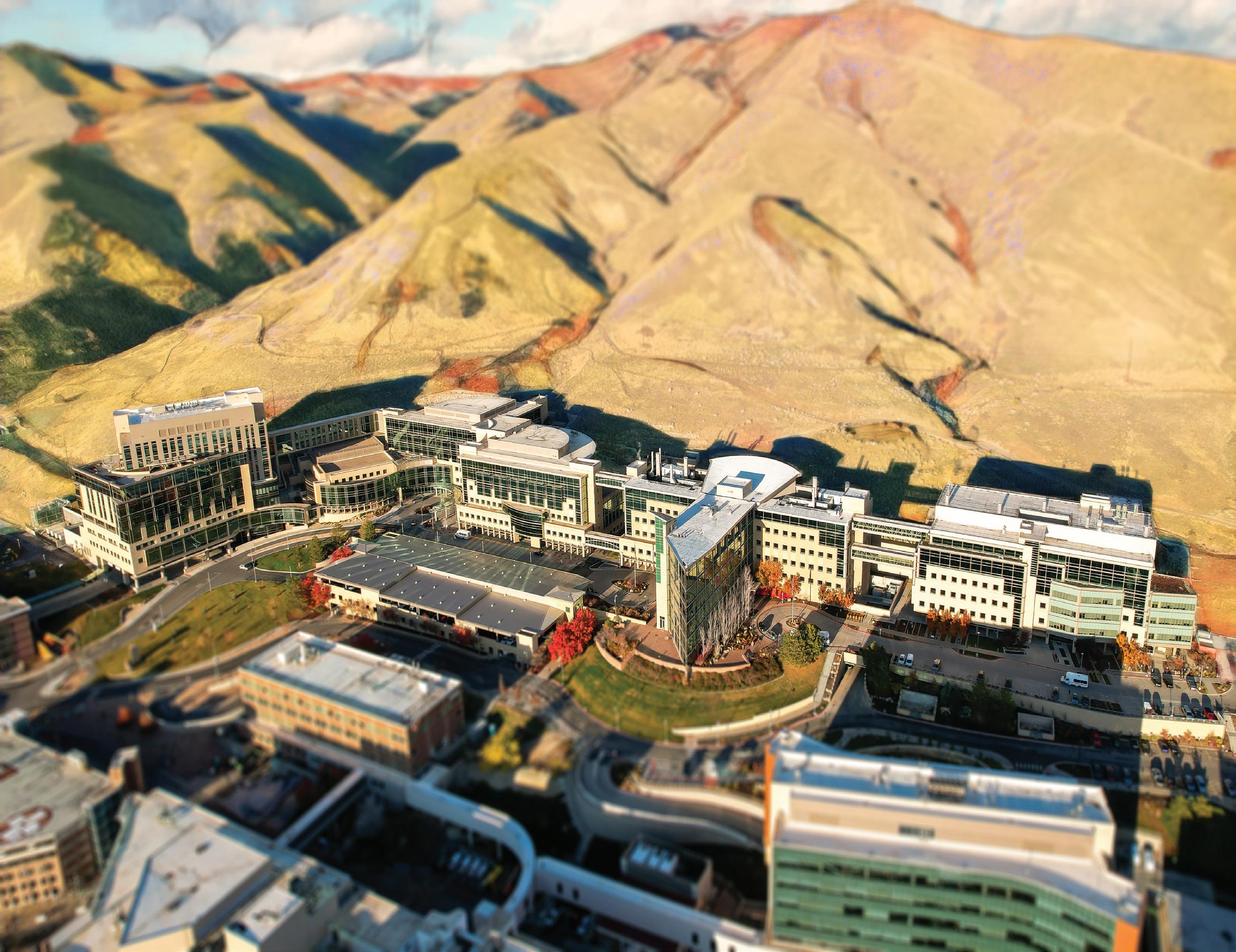
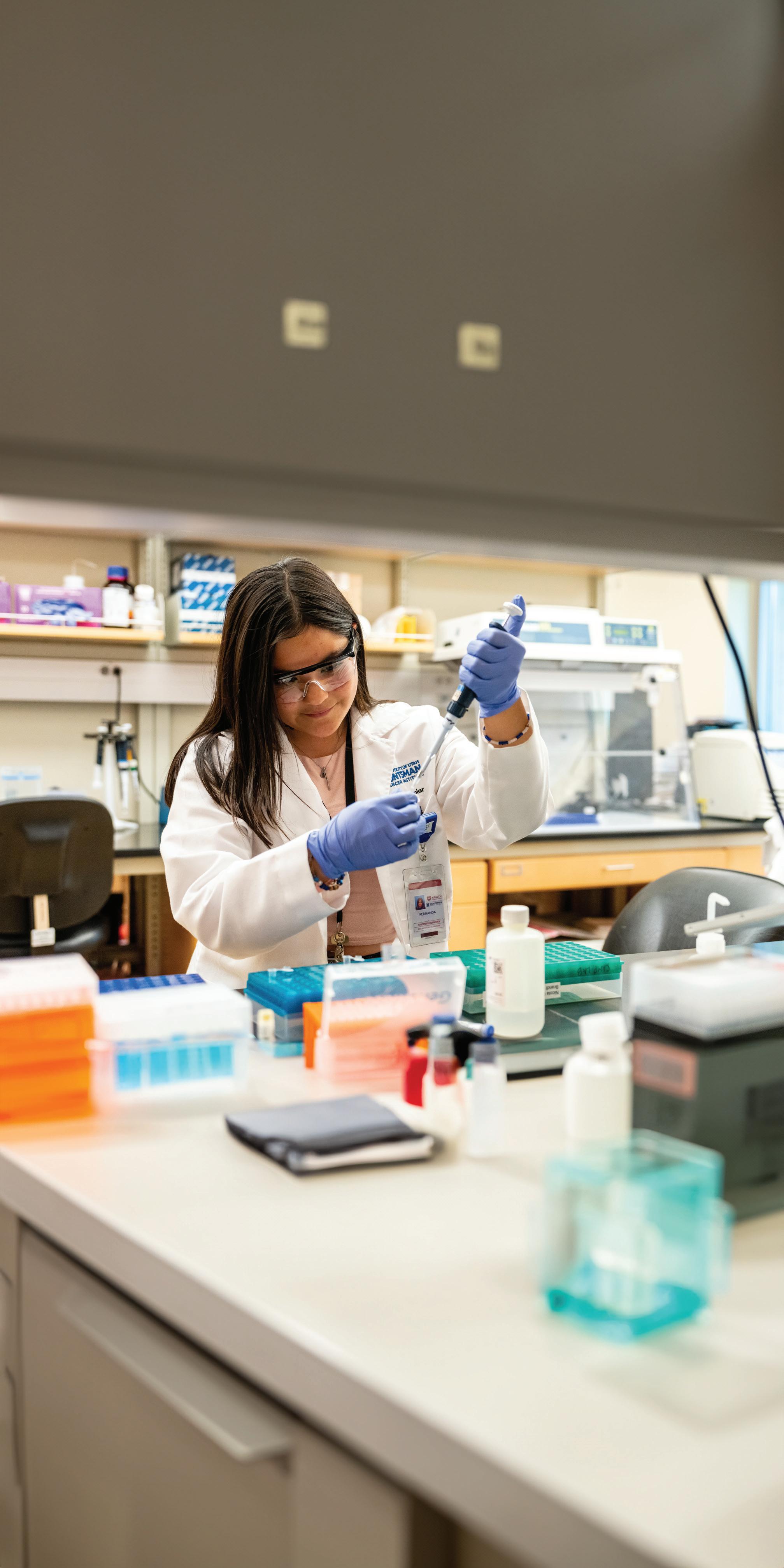


IN OUR FIRST 25 YEARS we transformed the way cancers are understood, prevented, detected, diagnosed, treated, and survived for patients throughout the Mountain West and around the globe.
WE CAN’T WAIT TO SEE WHAT THE NEXT 25 YEARS WILL BRING.
SCAN TO WATCH OUR VIDEO.
Take a journey back in time to our aspirational beginnings. The same vision that inspired us then still guides us today as we embark on the next generation of impact for our community.
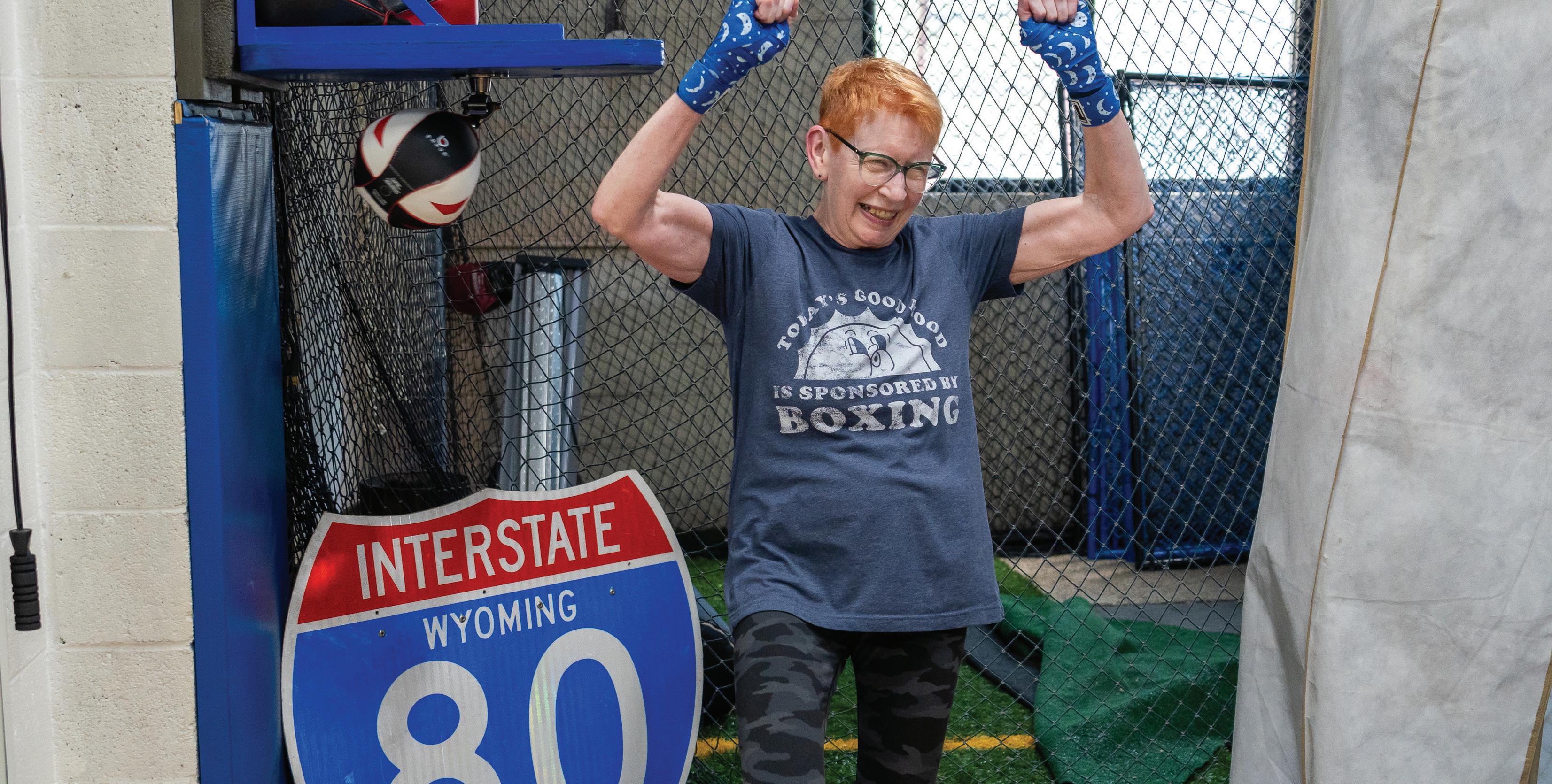
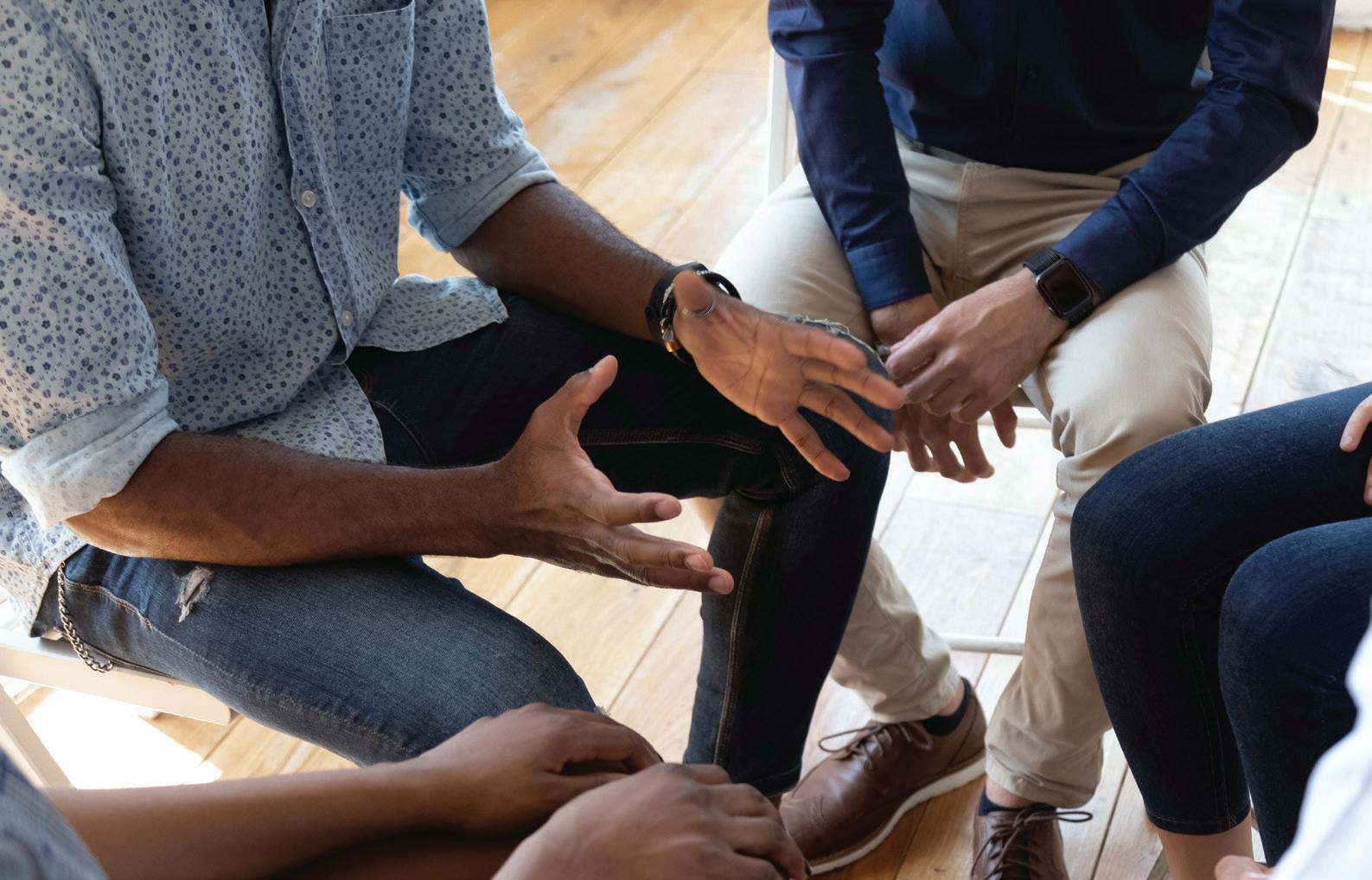

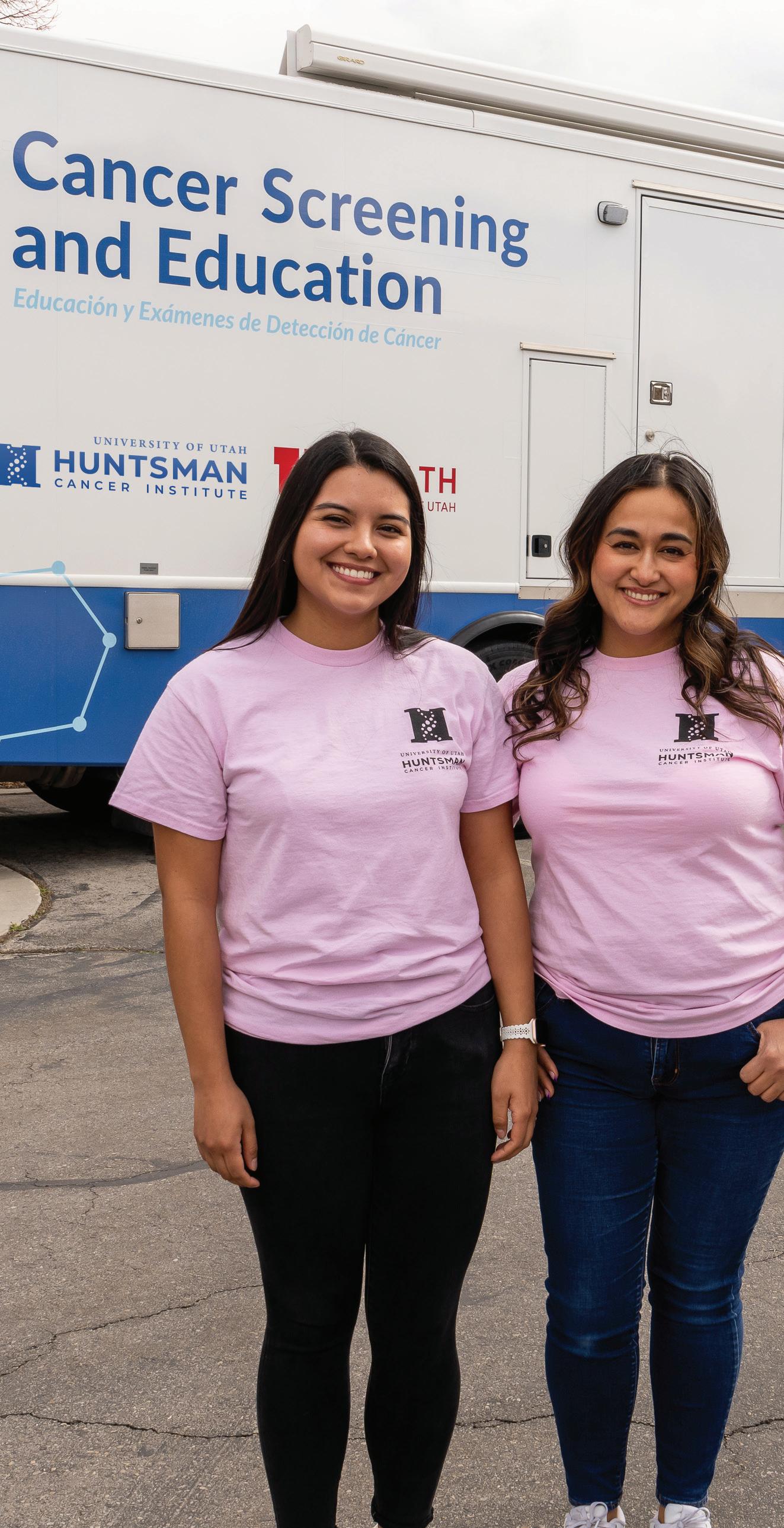
Persistence drove Diana’s journey from frightened patient to
A support group offers a
for men with cancer to process what they’re going through.


As the National Cancer Institutedesignated Cancer Center of the Mountain West, Huntsman Cancer Institute provides the highest standards for cancer research and treatment, with a legacy of innovative research, groundbreaking discoveries, and world-class care.
This magazine is published twice a year by Huntsman Cancer Institute at the University of Utah. It is conceptualized, written, and created by the in-house Communications and Public Affairs team.
Creative Director
Meredith Vehar, MPA
Designers
Claire Davis, MS
Mo Starr
Writer/Editor Drew Wiseman
Photographer Emily Bade
Project Manager
Matti McDaniel, MBA
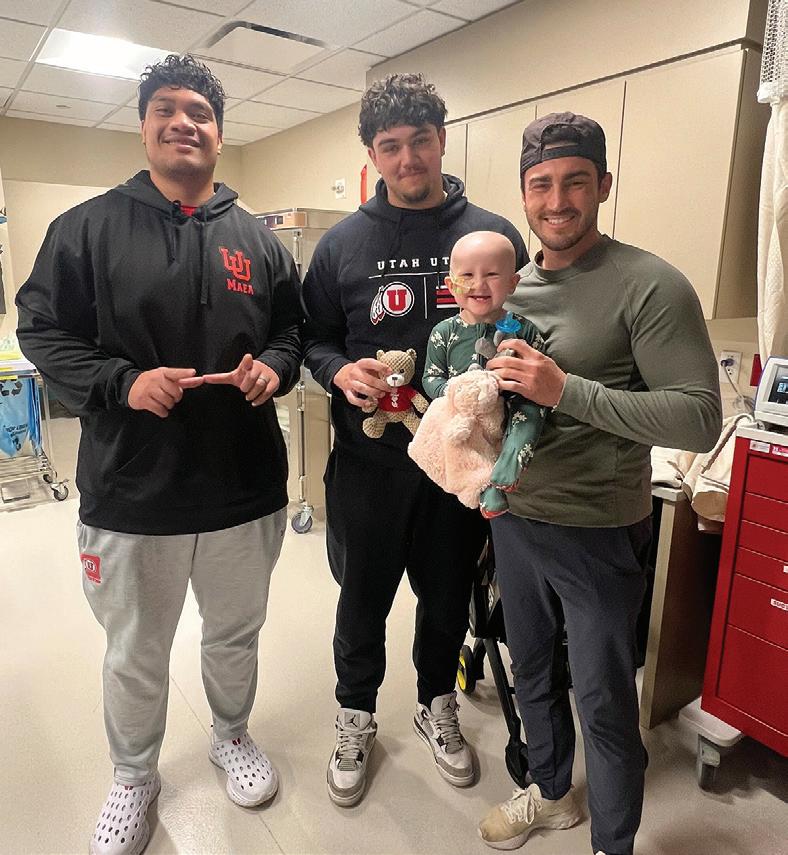
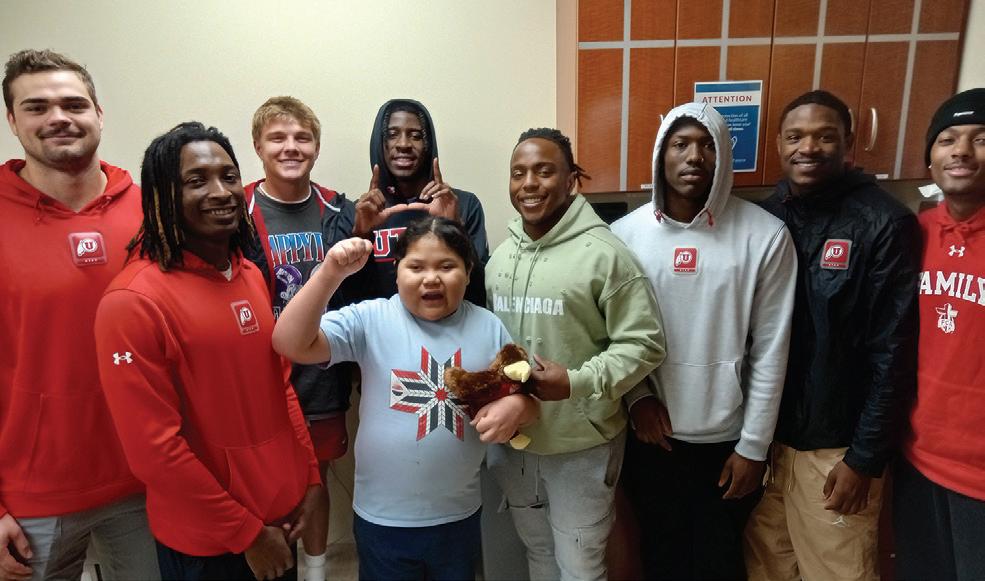
SEPTEMBER 8, 2023
Our pediatric patients had some special visitors this week— members of @UniversityofUtah football and basketball teams stopped by radiation to spend some time. Our patients, their families, and our staff loved having them here!
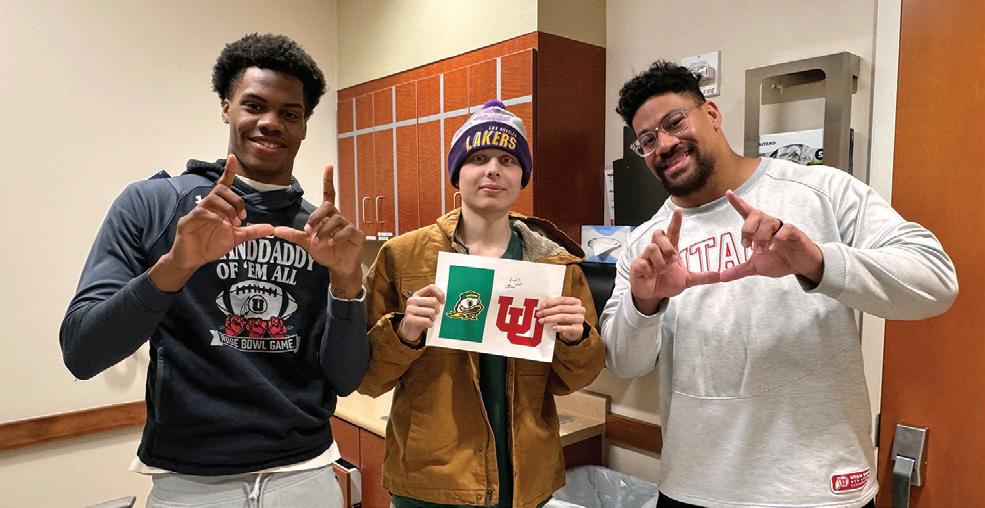
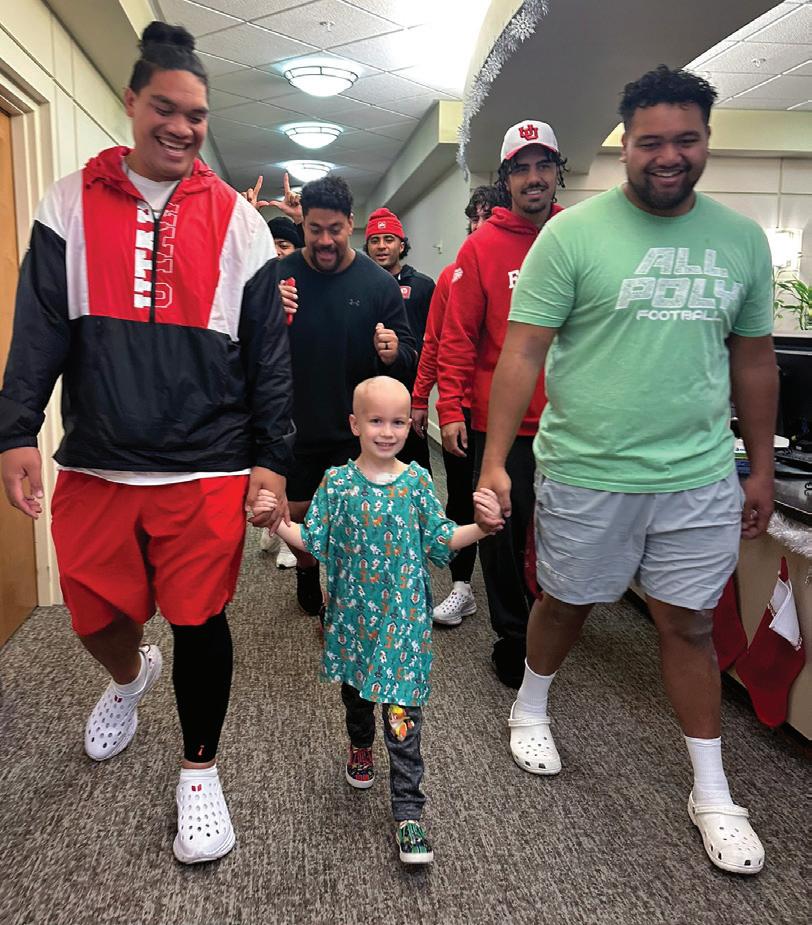
JANUARY 5, 2024
It’s always a good day when our friends from The University of Utah Athletics stop by! Thank you for brightening our day and bringing smiles to our patients and staff!
#FlashTheUFriday #GoUtes
APRIL 9, 2024
Nothing brightens our day quite like a visit from our friends at @UtahAthletics! Seeing the joy they bring to our pediatric patients and their families never gets old. We are so grateful for the time they spend with us!


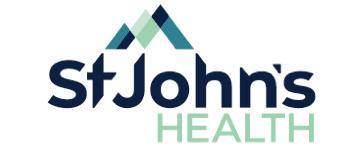
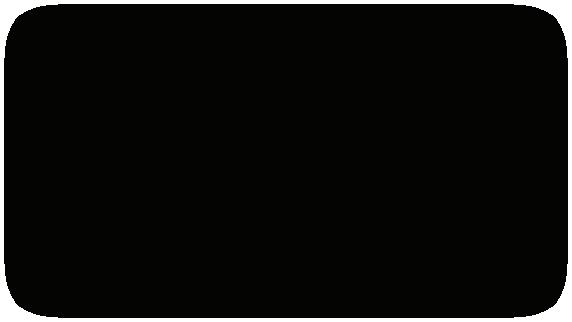





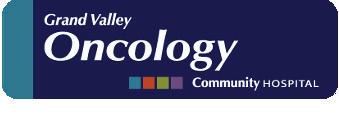


Diana Wiig never imagined she would become a staunch advocate for cancer patients. Diagnosed with stage 4 metastatic melanoma in 2022, her journey to becoming a determined spokesperson and member of the Community Advisory Board at Huntsman Cancer Institute has touched many lives in her Wyoming town and far beyond.
“When I was first diagnosed, I didn’t consider myself an advocate,” Diana says. “I was
shellshocked, overwhelmed with my own grief and fear. Googling my condition only heightened my anxiety. It wasn’t until I realized I had a chance to live longer that I began to think about others going through similar experiences.”
Diana’s transformation into an advocate began with her participation in an online melanoma support group and an in-person one for patients and their spouses that is sponsored by Sweetwater Regional Cancer Center and the state of Wyoming. “There are usually between two to five people,” she says. “It’s been a lifeline for me over the past year or so. We share our
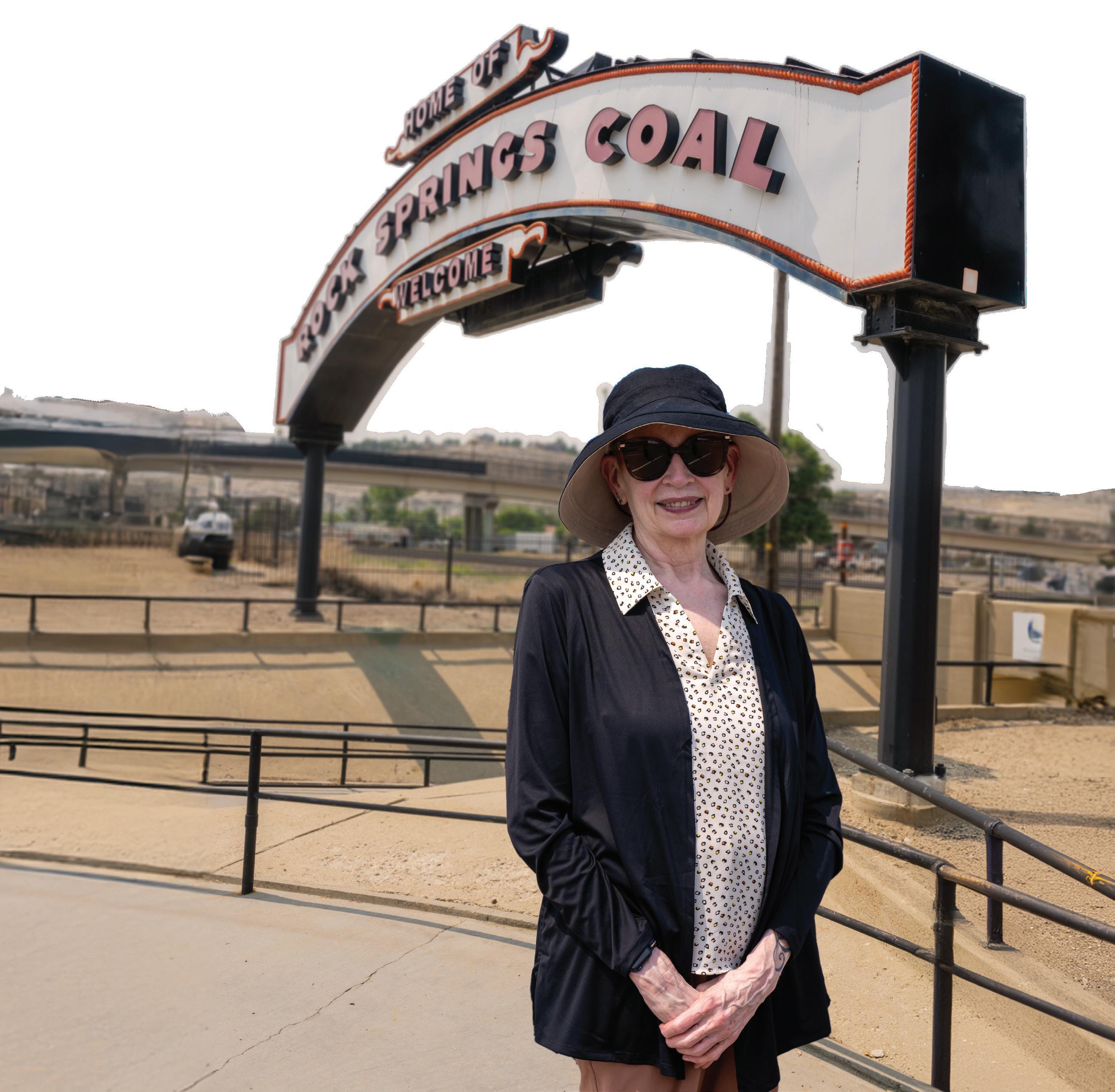

experiences and support each other through our struggles. Being a part of this ‘little club,’ you learn more about what your state cancer coalition is doing. Little things, like giving out sunblock at parks and being active in the community, are ways they’re having a positive effect.”
Work with the Community Advisory Board took a significant step forward in October 2023, when Diana traveled with leaders, trainees, caregivers, and community partners to Washington, D.C. “We didn’t expect to speak directly to senators or lawmakers, but we wanted to put a face to [cancer],” she says. “I was the only patient who went. Hearing what other states are doing was eye-opening. We all want to help each other and ensure people in the region can get optimal treatment, even if they have to travel across state lines.”
Another key component of Diana’s advocacy can be found in her teaching background. “As a woman of science, I do my research and ask the right questions,” she says. “Teaching has also helped me communicate
CONTINUED ON NEXT PAGE
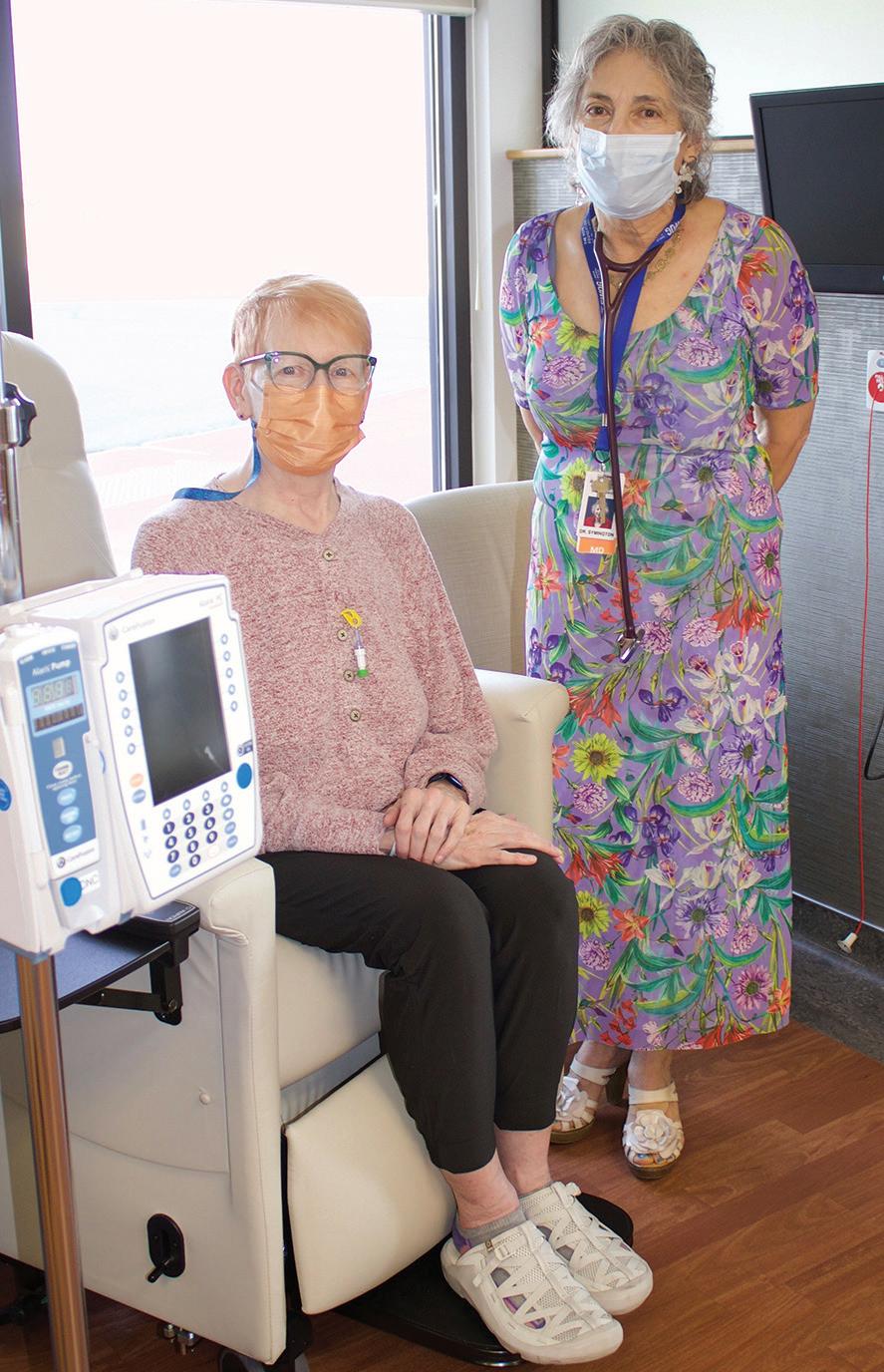
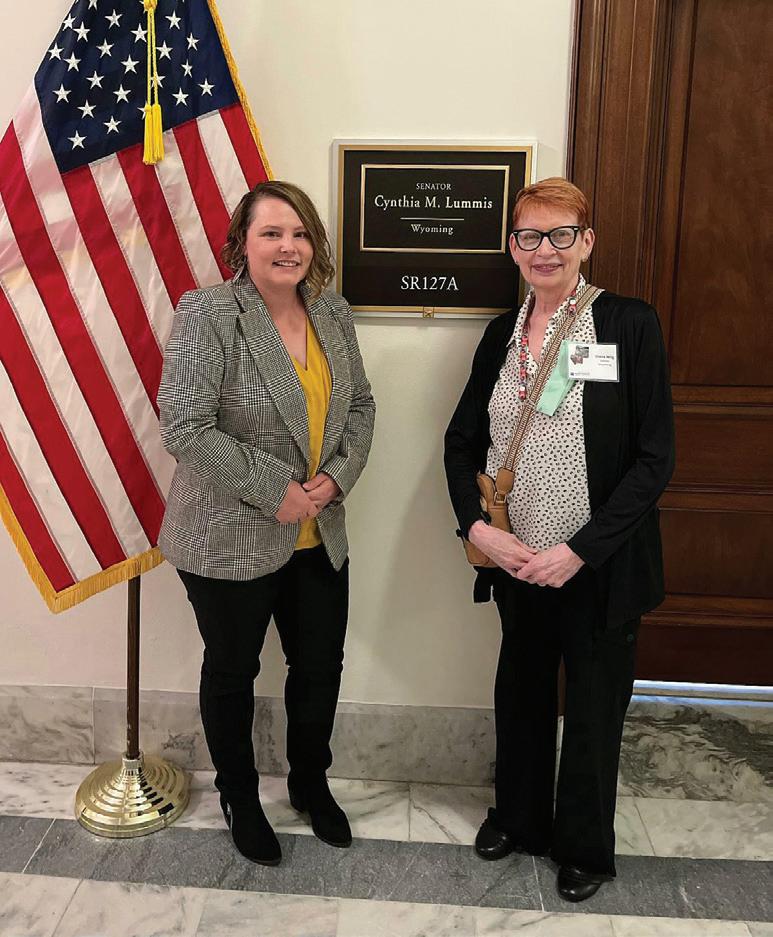
In October 2023, a team of leaders, community partners, trainees, patients, and caregivers from Huntsman Cancer Institute at the University of Utah traveled to Washington, D.C. and met with U.S. senators from the Mountain West to discuss cancer care challenges. The team highlighted the unique burdens faced by patients in these states, such as long travel distances for treatment. They also discussed ongoing initiatives to improve cancer care, including increasing access to clinical trials and biomedical research funding. The trip fostered collaboration with policymakers and addressed disparities in cancer treatment. Patient voices, like that of Diana Wiig, emphasize the impact of these challenges and the importance of accessible care. The meetings underscored the critical need for continued advocacy and support for cancer patients across the region.
effectively, whether one-on-one or in public speaking. It didn’t prepare me for the emotional impact of my diagnosis, but it made me flexible and resilient.”
Diana’s experience in education and championing under-resourced students has deeply influenced her approach to advocacy. “I worked on a reservation for a while and saw firsthand how standardized testing can be flawed and how students often don’t know the resources available to them. This awareness carried over into my cancer journey. Advocacy, like teaching, is about planting seeds of information that can help others later on.”
This entire time, Diana has received treatment at Sweetwater, a Huntsman Cancer Institute affiliate hospital in Rock Springs, Wyoming. She has never had to travel to Salt Lake City, where many of her peers receive care. “I’ve done everything here [at home],”
Advocacy, like teaching, is about planting seeds of information that can
help others later on.
Diana Wiig
she explains. “I receive Nivolumab treatments every month and after starting out with visible tumors, my markers have gone down considerably. The medication has been extremely successful,” she says, crediting her doctors for their optimism and support.
Early on, Diana struggled with her diagnosis. “When I first learned about it, I was reeling,” she says. “We had a family gathering


scheduled and I thought it would turn into a wake. So, my husband and I agreed to stay silent. It was easier than I thought to hide my diagnosis. I slept a lot, lost weight, and hit bottom. My husband, who is usually quiet, has been a rock through all of this. I didn’t want cancer to define me. Then after I started to improve, I began dealing with survivor’s guilt. A trauma specialist has really helped.”
Physical activity is also a significant part of Diana’s life. “Boxing is great for me,” she says with a smile. “It keeps me active, and my coach treats me like anyone else, which is important. When you’re boxing, you don’t let your guard down. You stay prepared and focused.”
In addition to boxing, Diana practices Qigong, an ancient Chinese exercise that combines breathing and movement. “Qigong grounds me,” she says. “Both have been crucial in strengthening my mind, balance, and stamina.”
Diana’s journey from a frightened patient to a powerful advocate shows the strength of the human spirit. Her story is a beacon of hope for those navigating tumultuous waters, reminding us of the importance of support, resilience, and advocacy through education.
CANCER TREATMENT CAN IMPACT A PERSON'S SENSE OF SELF AND BODY. Huntsman Cancer Institute’s Wellness and Integrative Health Center addresses physical, emotional, and mental aspects of healing for a variety of symptoms.
SOCIAL ISOLATION & SELF-ESTEEM
Artist-In-Residence
Fitness Classes
Massage
Music Therapy
Writer-In-Residence
NEUROPATHY
Acupuncture
Osteopathy POWER Program
Acupuncture
Mindfulness
Nutrition NAUSEA & VOMITING
HOT FLASHES & NIGHT SWEATS
Acupuncture
Mindfulness
PAIN
Acupuncture
Massage
Music Therapy
Osteopathy
Physical Therapy
DIARRHEA &
DOUGLAS SBOROV, MD, MS
Associate Professor
Department
Acupuncture Massage Music Therapy POWER Program DEPRESSION, ANXIETY, & STRESS
WEIGHT MANAGEMENT & APPETITE CHANGES + -
Nutrition
NEW You Weight Management
FATIGUE
Acupuncture
Fitness Classes
Nutrition POWER Program


BRINGING WORLD-CLASS CANCER CARE, RESEARCH, AND TRAINING CLOSER TO MORE COMMUNITIES WITH A SECOND LOCATION IN UTAH COUNTY .

On Thursday afternoons, a small group of men gather virtually. Some sit and listen. Others open up a little.
A few let their emotions flow.
These sessions are part of a support group for men grappling with the many side effects—mental, physical, and spiritual—of a cancer diagnosis. The aim is not just to survive but to thrive, finding strength in shared experiences and mutual support.
“The goal of the men’s support group is to offer a safe space for men to process what they’re going through,” says Sean Hadley, LCSW, social worker at Huntsman Cancer Institute. “All sorts of concerns can arise from a diagnosis, and this group helps them navigate these issues.”
Sean, who has been working with the group since 2023, explains that each meeting is structured to provide a mix of education and support. Every other session features a guest speaker, ranging from pharmacists and dietitians to pelvic floor therapists, mindfulness coaches, and sleep psychologists.
The group attracts a diverse range of participants. Ages vary from men in their 20s to early 70s, though the majority are between 45 and 65. The meetings are held via Zoom, making them accessible to patients no matter where they live.
Julio Jarvis, LCSW, started the group because he saw a gap in resources for men with cancer. “I have a background in mental health and crisis management, and I was running my own practice in 2008 when I was diagnosed with cancer. I’ve undergone immunotherapy, surgeries, and radiation for my cancer diagnoses.”
“One of the most powerful aspects of the group is that it provides a space for men to open up about their struggles,” Sean says. “Men are often socialized not to share their feelings and just do what they need to do. If you’re not showing emotion, it doesn’t mean you don’t have any. There’s also a stereotype that men need to fix things, to handle everything on their own. This group challenges that norm, creating a space where it’s okay to say, ‘I’m in pain, I’m struggling emotionally.’”
For many of the men, the group provides a muchneeded outlet for emotions that can be difficult
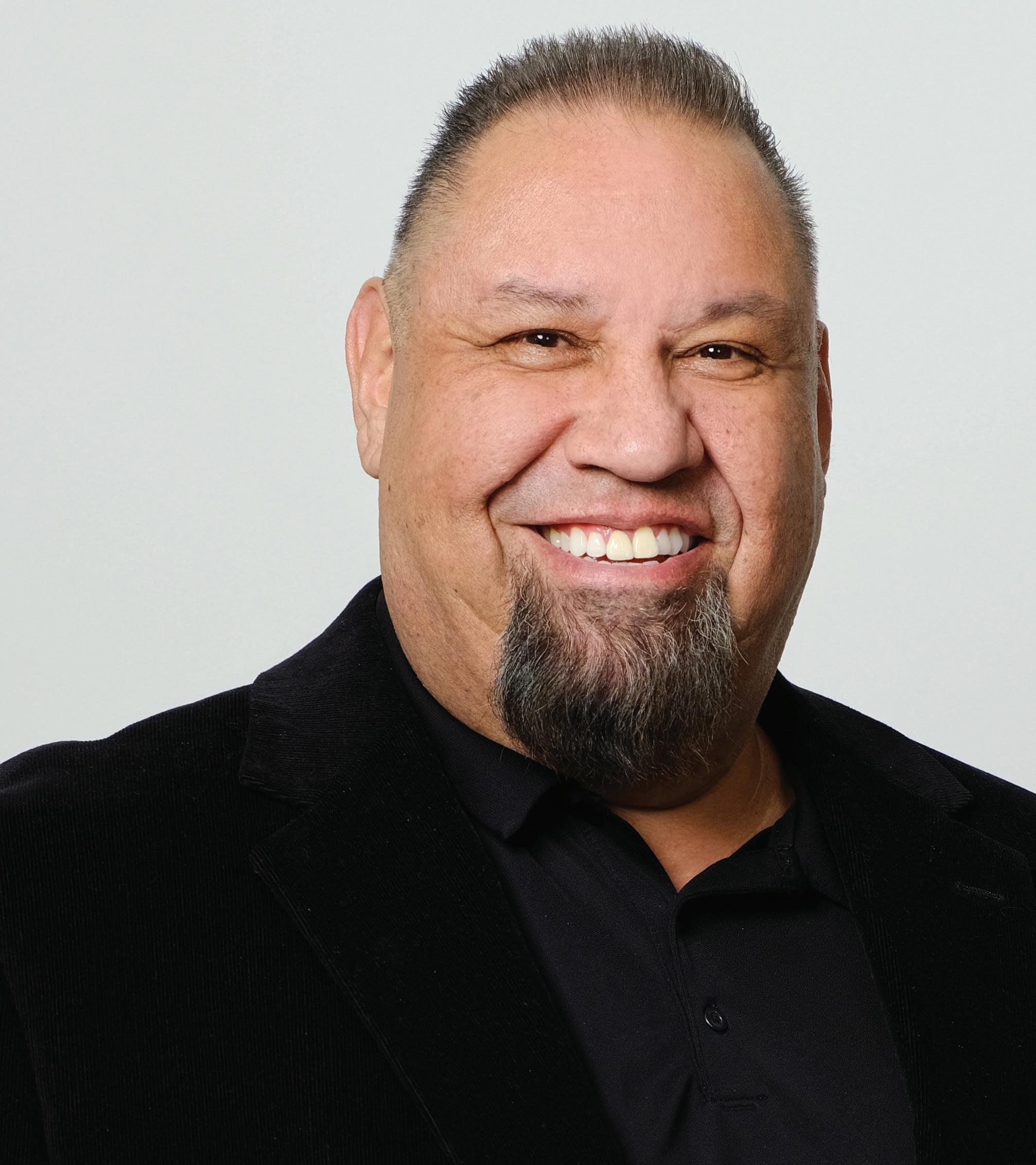
to express elsewhere. Feelings of guilt, shame, and worthlessness are common, and the group offers strategies to cope with these emotions. Simple steps like breathing exercises, grounding techniques, and mindfulness are taught to help manage anxiety and prevent rumination.
Reflecting on his journey, Julio’s passion is evident. “I joined the military at 17 and learned I could overcome hard things. Going through basic training, you see the downfalls of not having a safe space and how destructive behaviors can compensate for lack of expression.”
Sean’s role in the group is to facilitate discussions, encouraging participants to share their experiences and support each other. “The group is the solution,” he states. “My role is just to get them talking and be there to help. Their resilience is impressive. They come in and laugh and joke while sharing some heavy stuff. It’s an honor that they come in and share. They are as positive as they can be.”
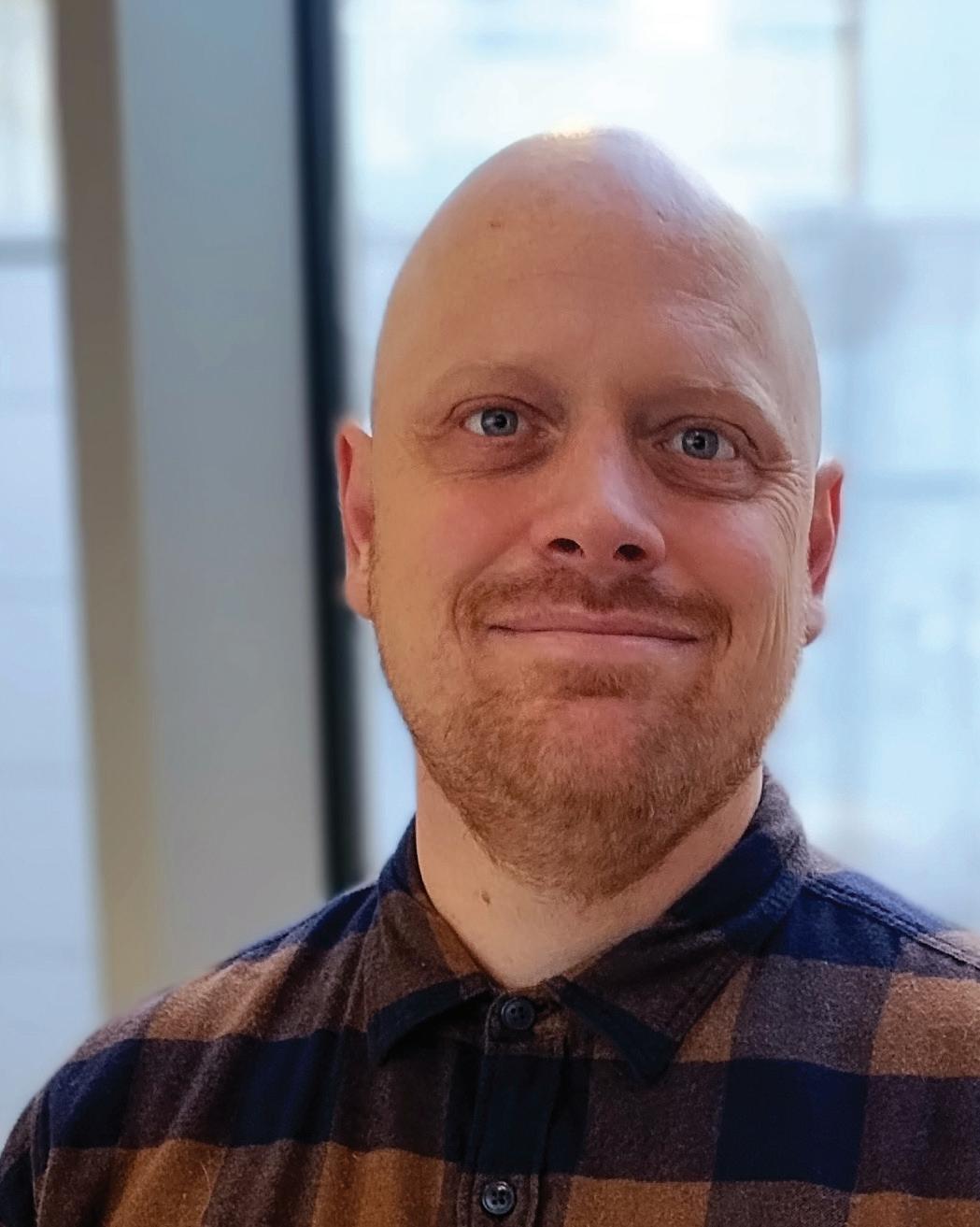
Julio notes that this unique group covers all cancer types, not just prostate cancer, as some might assume. “Everyone appreciates that this is a safe space. There’s a stereotype that men need to fix things, to handle everything on their own. This group challenges those societal norms.”
Steve Rose, initially nervous about joining, quickly found value in the group. “I am so glad that I have been able to attend several meetings and participate. Even though several of us have different kinds of cancer, we all have a lot of issues and concerns. I am a better person for it.”
Julio emphasizes the importance of understanding available resources and knowing one’s care team. “Most people aren’t aware they are assigned a social worker. Pain management, massage, acupuncture, writing, music therapists—these are all available to help.”
The harsh reality of cancer is ever-present, as Julio notes. “Time is limited. The way you look at life drastically changes. We lose a member every couple of months. It’s hard. But the comfort and consistency the group provides is very supportive.”
I am so glad that I have been able to attend several meetings and participate.
Steve Rose
“I got into social work to help others,” Sean adds. “It’s what I want to do. You can make a difference.” About cancer, he notes, “People forget the mental wear and tear it takes. You know there’s a physical toll, but it is rewarding to help people with their feelings.”
For those hesitant to join, Julio offers reassurance. “Give it a try. Those who come to a meeting know soon that this is right for them.”
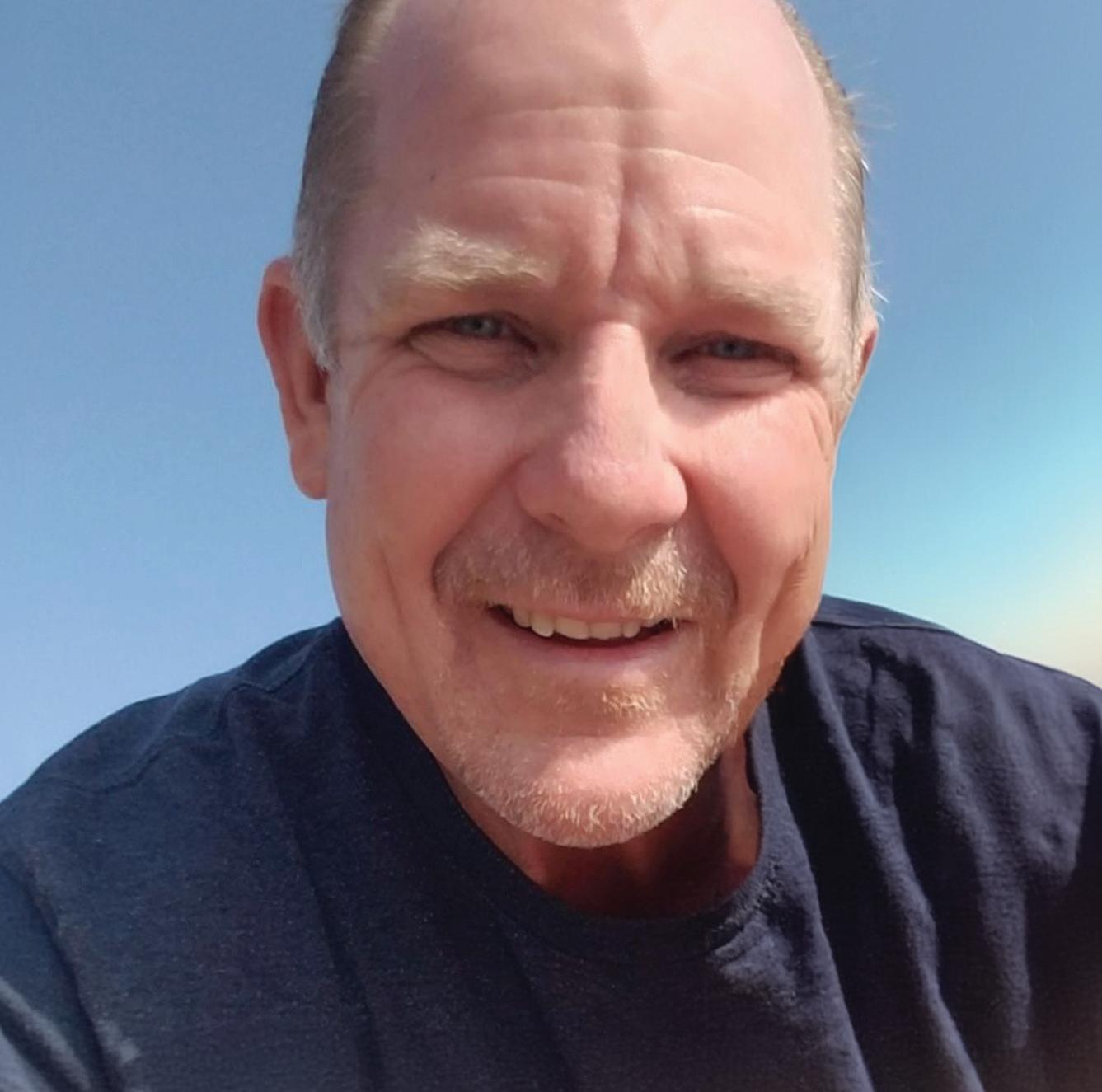
To learn more about the support group or to sign up, call 801-213-5940 or email Julio.Jarvis@hci.utah.edu.
Clinical trials are only for people who have no other treatment options.
Many trials are available for patients at various stages of their disease. They can be a lifeline for patients with advanced cancer. They may also explore new ways to detect, diagnose, and reduce cancer risk, or manage symptoms and side effects.
Clinical trials are experimental, so they are less safe than standard treatment.
If I participate in a clinical trial, I may receive a placebo instead of treatment.
Clinical trials may have risks, like any medical treatment or procedure. Patient safety is always our top priority. Participants are monitored very closely. Every clinical trial is reviewed by our expert teams to determine safety and usefulness before they are open to patients, and they are conducted and reviewed following federal laws and clinical practice regulations.
In clinical trials today, placebo options are not frequently used alone. If a placebo is used, it is usually in combination with standard treatment, so most patients are getting an active treatment. A patient in a clinical trial will always get the highest level of care.
Clinical trials are not covered by insurance and are too expensive.
Much of the care in a trial is the same as if you were receiving standard treatment and is covered by health insurance. If a clinical trial requires extra tests and procedures, they will be likely paid for by the study sponsor. Your doctor or clinical research team will discuss this with you. If you have questions, you can speak with your care team or Huntsman Cancer Institute’s financial advocates.
Once I enroll in a clinical trial, I can’t change my mind.
My doctor must refer me to a clinical trial.
Clinical trials are only available at the main Huntsman Cancer Institute hospital.
Taking part in a clinical trial is always your choice. You can discuss with your doctor if you want to stop at any time and for any reason.
Your doctor may suggest a clinical trial as a treatment option for your care. However, they may not be aware of every available clinical trial. Patients can visit our website to view all available clinical trials, and even self-refer: healthcare.utah.edu/clinical-trials/search
While we conduct the majority of clinical trial care at the main hospital, some trials are available at our community clinics and affiliate hospitals. Often, clinical trial processes and procedures such as lab collection can be performed at community and affiliate sites.
If you are interested in participating in a clinical trial, talk to your care team.
/skan-ZIGH-uh-dee/
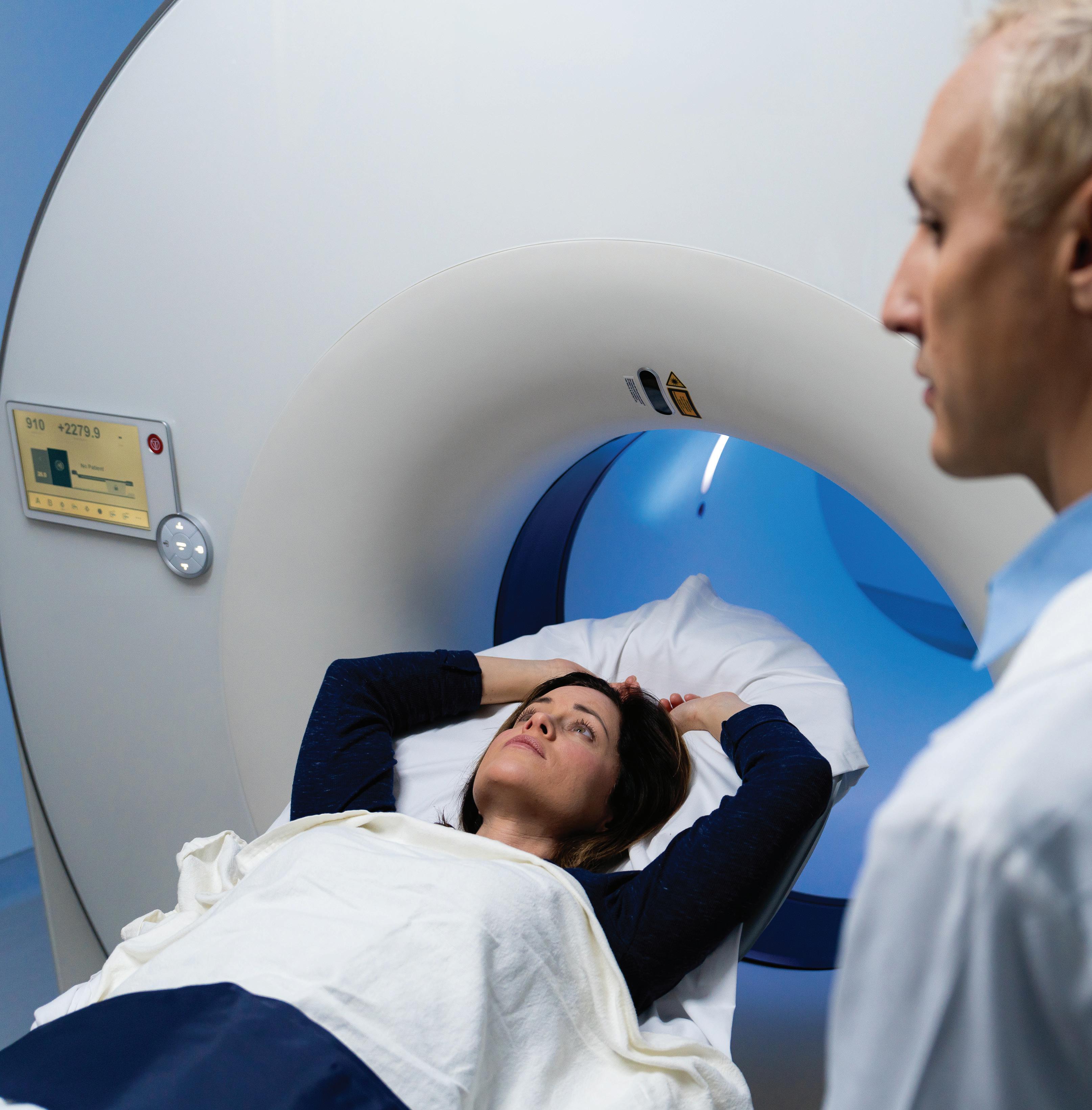
(noun)

A feeling of dread, fear, and uncertainty revolving around a scan. Sometimes it interferes with sleep, eating, focus, or motivation. It can make you irritable, tired, sad, or overwhelmed. In some cases, it might be hard to explain what you are anxious about.

Anxiety around medical scans is common for many people, whether the scan is for a routine screening or to check the effectiveness of a cancer treatment.


PATIENTS: Recognize that this is normal. If it helps, learn more about the scan and what the results could mean. If it doesn’t help, stay away from internet searches and focus more on distracting yourself and finding ways to relax. Lean on your loved ones to talk about your fears and concerns. Your health care team can help you with coping strategies or provide medicine if needed.
Listen to your loved one’s concerns. Take care of yourself as well. Scanxiety can impact you just as much as the one who has cancer.
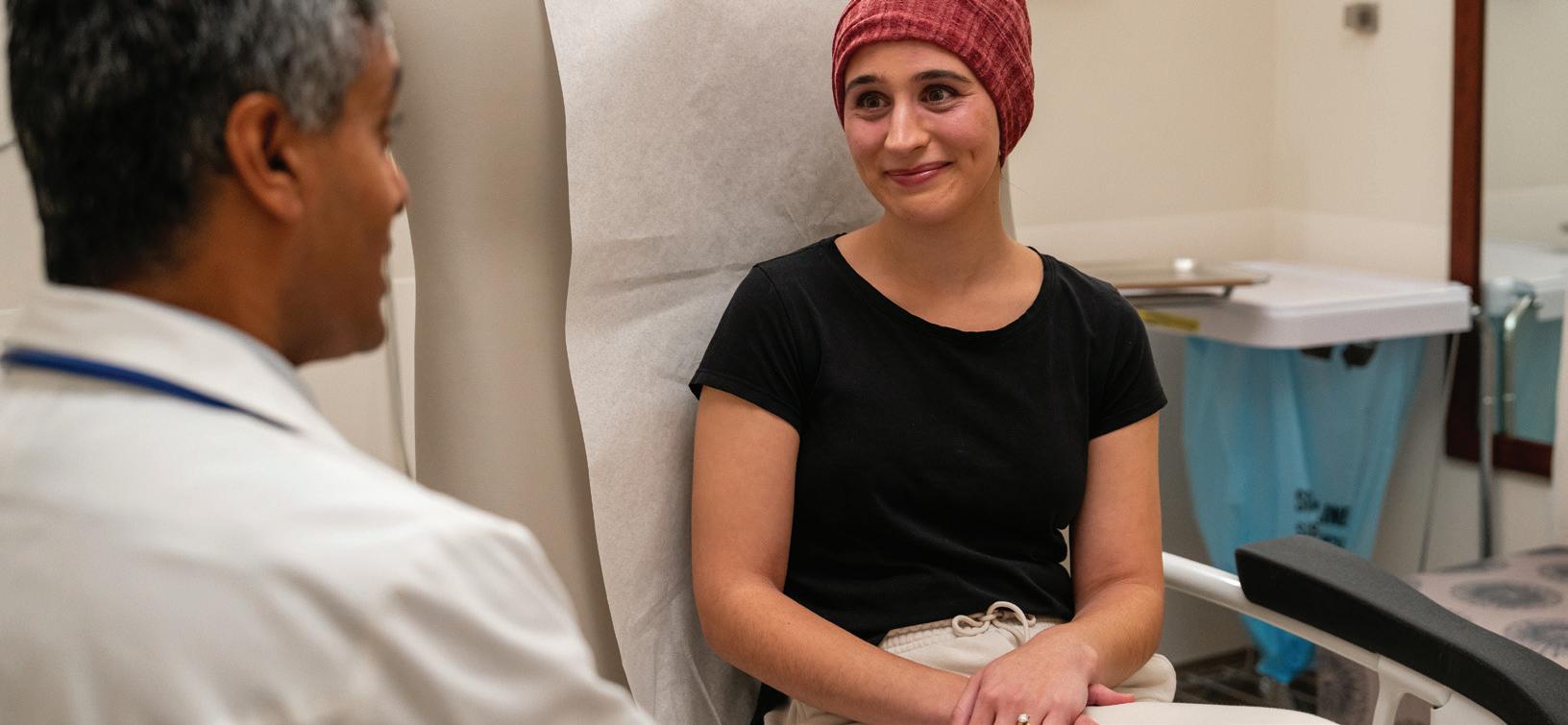
Although scans provide important information to help in making decisions about next steps in cancer treatment, the importance doesn’t necessarily erase the worry. It is normal to be afraid that results will show cancer returning or progressing. Because testing schedules are based on a person’s specific type of cancer and stage of treatment, this can lead to a regular cycle of scanxiety.
Our Patient and Family Support social workers help people with cancer and their loved ones with the many and varied emotions that come with a cancer diagnosis. They are here to help.
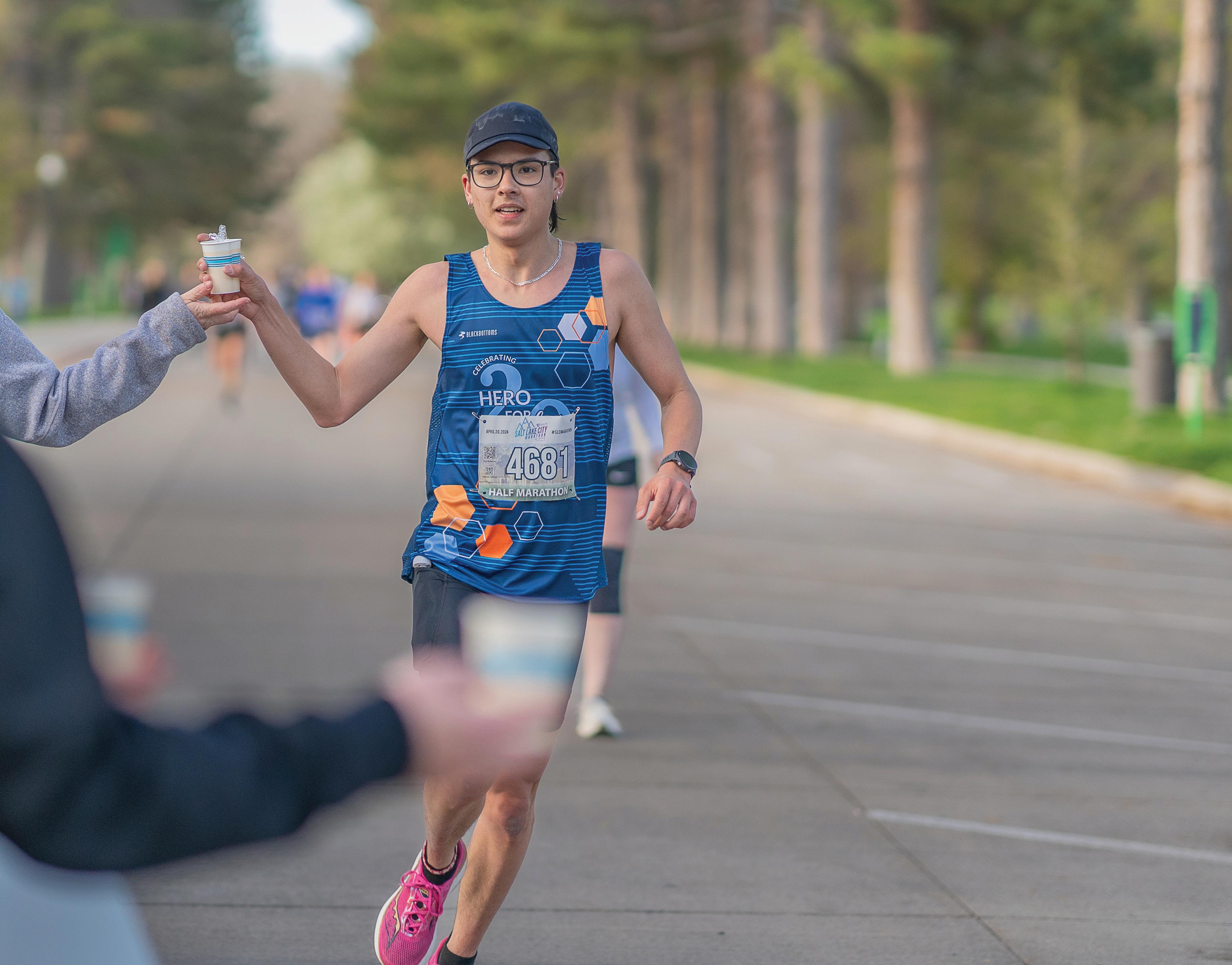
If there are runners out there who feel strongly about cancer research, Huntsman Heroes is definitely a great way to run with some amazing people, but also for a great cause that impacts so many people every day.
JADEN MECHAM
OPTIC GLIOMA PATIENT & HUNTSMAN HERO PARTICIPANT

Huntsman Heroes share the same goal—eradicating cancer. They also enjoy the following benefits:
• Guaranteed entry into select running and cycling events
• Personalized coaching
• Team swag
• Fundraising support
The 2024-2025 season kicks off with training runs every Saturday starting in November and going through May. Training runs are open to everyone through November and December. Come check out the program and meet the team!
ALL
Learn more or register at huntsmanheroes.com or email events@huntsmanfoundation.org.
For many, navigating medical finances while dealing with a cancer diagnosis can be overwhelming. Huntsman Cancer Institute is here to help ease the stress that may come from medical bills and insurance claims. From our financial advocates and Cancer Learning Center staff to our social workers and patient navigators, there are people here to help you with your financial questions so you can focus on treatment. Here are some frequently asked questions (FAQs) about insurance, billing, and financial assistance.
One of the first steps in managing your finances during cancer treatment is understanding your insurance benefits and requirements. Huntsman Cancer Institute’s financial advocates can help you gain a clear understanding of your coverage.
Insurance benefits refer to the coverage and services provided by your insurance plan. These benefits vary depending on your specific insurance provider and plan. For example, benefits may include coverage for medical services, hospitalization, prescription drugs, preventive care, and wellness programs. If you have questions about the benefits provided by your insurance plan, we recommend you reach out to your insurance provider directly. If you have questions that involve Huntsman Cancer Institute, you may ask a financial advocate for guidance.
We accept a wide range of insurance plans, including Aetna, Blue Cross Blue Shield, Cigna, and more. Depending on your insurance, we will review and assist with your network questions. If your insurance is out of network, we provide billing for out-of-pocket costs and may recommend seeing specific in-network providers to minimize expenses. In addition to Huntsman Cancer Institute providers, you may want to confirm that the individual health care providers you will be seeing are in-network. This includes physicians, specialists, nurses, and any other health care professionals involved in your care.
If you would like to estimate out-of-pocket costs, access our online tool using your insurance information.
healthcare.utah.edu/bill
If your insurance doesn’t cover a specific treatment, our financial advocates can explore alternative options and assistance programs with you.

There are various local and national organizations that aid those in need, covering medical costs, treatment-related expenses, and everyday living expenses. The help available to you may vary depending on where you live, your income and medical insurance, and what cancer or medical conditions you have now, or have had in the past.
Our teams at Huntsman Cancer Institute can help answer your questions and match you to programs. We are here to help you navigate the financial aspects of your cancer journey.

Under Huntsman Cancer Institute’s financial assistance policy, you may be eligible for full or partial reduction of your bill based on your total household income in relation to federal guidelines.
Medicaid is a government-funded health care program in the United States that provides medical assistance to individuals and families who are below a certain income level. Medicaid rules have changed for Utah, and you may be eligible for coverage. Learn more about Medicaid eligibility and enrollment.
There are many resources and grants available to people with cancer. Government programs like Medicaid and Medicare offer health care coverage, while nonprofit organizations like the American Cancer Society and CancerCare provide financial aid and support services.
Staffed by cancer information specialists, the Cancer Learning Center is a free service that is available to everyone. They can help you find national resources and resources in your community.
huntsmancancer.org/clc 1-888-424-2100
Talk with your social worker. Social workers with Huntsman Cancer Institute’s Patient and Family Support team provide support with practical concerns such as finances and workrelated issues. If you are not a Huntsman Cancer Institute patient, ask your cancer team to connect you to their social worker.
huntsmancancer.org/support 801-213-5699
Work with a patient navigator. Patient navigators make sure patients and caregivers get needed services. If you are not a Huntsman Cancer Institute patient, ask your cancer team if they have patient navigators, nurse navigators, peer support, or other programs that can help connect you to resources and financial aid.
navigation@hci.utah.edu 801-646-4254
We strive to provide transparent billing procedures for our patients. Our financial advocates can assist you with everything from billing policies to statements or outstanding balances.
In 2019, Huntsman Cancer Institute launched a mobile mammography clinic, making state-of-theart mammograms accessible for all Utah residents, even those in our most distant, rural areas and underserved urban communities. This program is possible thanks to partnership with local groups like nursing homes, religious organizations, and regional clinics. For people who are low-income, uninsured, and underinsured, cost is less of a roadblock thanks to a Utah Department of Health voucher program, which helps pay for nearly half of all mobile clinic visits.
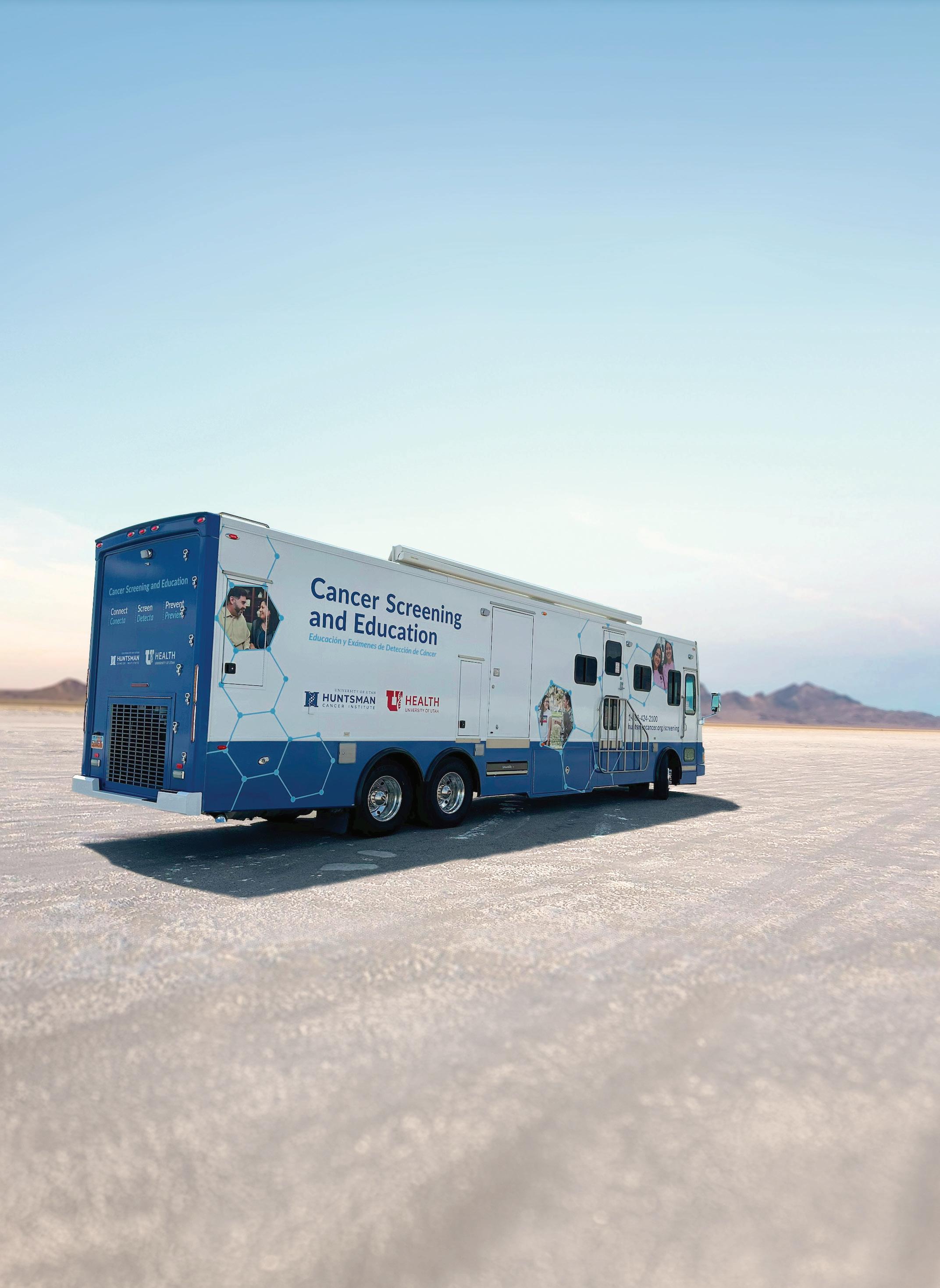
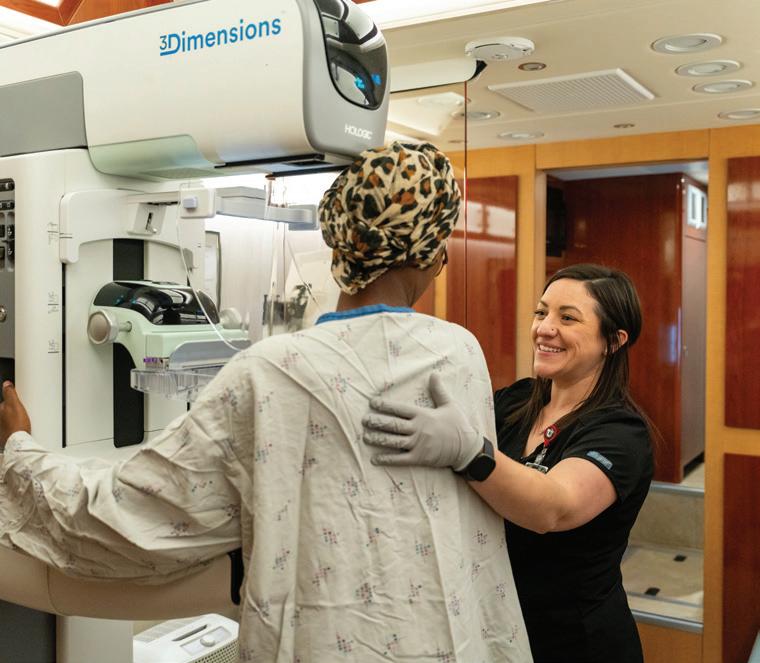
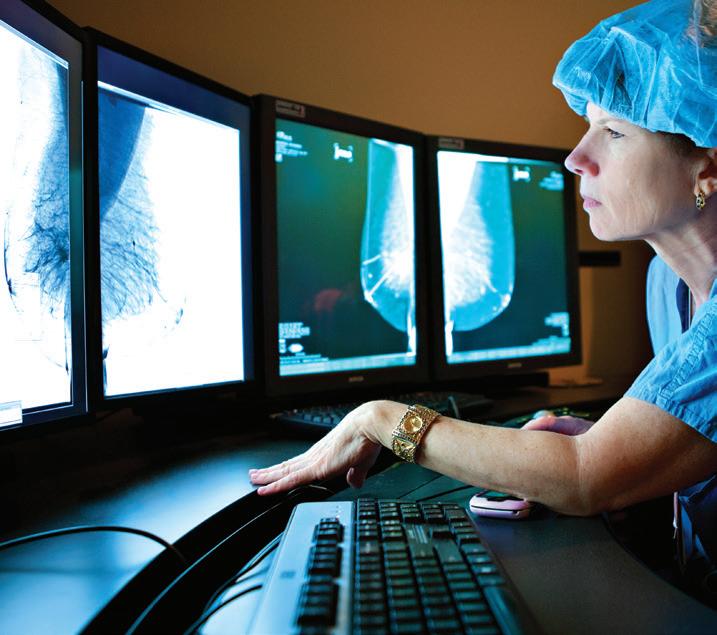
B rd-certi ed radi ogists read the results.
As July 2024, the M ile Screening Clinic has sited 20 Utah c nties and pro ded 6,869 screenings. Certi ed technicians perf m mammograms.


On the heels of that success, we will roll out a second mobile screening clinic in early 2025. This addition will increase screening capacity and expand access to even more communities.
Discussions with partners, patients, providers, community stakeholders, and leadership from both Huntsman Cancer Institute and University of Utah Health helped determine the cancer services that Utah communities need the most.
A r m f rtual in-pers genetic c nseling
M e space f registrati , c sultati , and partner use
A phle y stati f d draws and testing

A larger educati area f treach
Two medical re igerat s f edical specimen c lecti
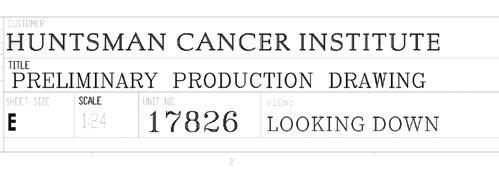
The clinic will offer cancer screening beyond mammography, says Lynette Phillips, community cancer screening manager for Huntsman Cancer Institute. “We are working on offering stool-based colorectal cancer screenings, cervical HPV (human papillomavirus) swabs, HPV vaccinations, genetic counseling, genetic testing, and potentially future blood-based testing.”
With this new clinic, the mobile screening program will not only continue to reduce health disparities caused by distance, it can also better meet the unique needs of each community it visits.
To learn more, including how to bring our mobile screening clinic to your community, visit

GITA SUNEJA, MD, MS Radiation Oncologist
Professor, Radiation Oncology
Senior Director, Programs to Enhance Diversity
When I started here 10 years ago, it was immediately clear that Huntsman Cancer Institute was on the rise. It was growing, evolving, and at the frontier of cutting-edge cancer care. I’ve seen so much change and innovation, and I am buckling my seat belt for the next 10 years. We have a phenomenal vision, and we have the right team of people to really deliver. We are well-positioned to take cancer treatment, cancer science, and discovery to the next level.
